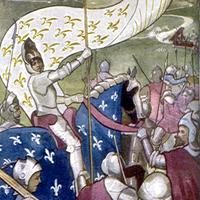30. The Stormy Cape
"Over the great windy waters, and over the clear crested summits, Unto the sun and the sky. come let us go. " —CLOUGH.
Prince HENRY was dead; but his work did not die with him. At the time of his death, in 1460, his ships had not gone farther than the spot where Hanno had found his gorillas two thousand years before, but he had roused in his countrymen the spirit of adventure, of curiosity in regard to the unknown seas, which should never die.
Some years after his death the equator was at last crossed. Wherever they landed it was the custom of the Portuguese to set up crosses to show that they had taken possession of the country. Sometimes they would also carve Prince Henry's motto on the trees, together with the name they gave to the new land. Later they took out stone pillars, with the royal arms sculptured in front surmounted by a cross.
In 1484 one of these stone pillars was set up by a knight of the king's household at the mouth of a large river known to us now as the Congo. From the river Niger to this river they found the coast very flat, made up of lagoons and swamps, with a bottom of black mud alive with land-crabs,—hot-beds of African fever.
It would take too long to tell how the King of Congo became a Christian, and commanded all the idols throughout his kingdom to be destroyed. How he received the Portuguese, seated on a throne of ivory raised on a lofty platform; his black and shining skin was uncovered, save for bracelets of copper on his arm, a horse's tail hung from his shoulder, and a cap of palm leaves. He was so impressed with the Portuguese that his children and grandchildren were sent to Lisbon to be educated.
We must now pass on to a great expedition which was fitted out by the King of Portugal for further exploration. Two small ships were made ready, and one Bartholomew Diaz, well known as a daring sailor, was given command. It was fitting that a Diaz should fulfill the ruling desire of the Prince's life. A Diaz had been the first to double Cape Bojador, a Diaz had been the first to reach Cape Verde. A member of the same sea-loving race was to sail first round the extremity of the unknown land of South Africa.
The little party reached the farthest limit of Portuguese exploration, and passed the farthest pillar on the coast of West Africa. Southward still they sailed, till they reached the mouth of the Orange River, which flows westwards, dividing the Orange River Colony from Cape Colony.
For the next thirteen days they were driven before the wind, due south, the weather growing colder and colder each day, for they were drifting far to the south of South Africa, though they still imagined the coast line ran north and south, as it had done for some time. When the wind abated a little, Diaz steered in the direction he imagined to find land, and was not a little surprised to find himself on a little island in what we now call Algoa Bay. Here he set up a pillar with its cross and gave it the name of Santa Crux, which name still survives. And this was the first land beyond the Cape which was trodden by European feet.
The crews now began to complain: they were worn out and weary, and they were alarmed at the heavy seas through which they were passing. Diaz, his resolute face set eastward toward the unknown, could not bear the thought of returning without further information to bring home. But with one voice the sailors protested. At last it was agreed that they should sail on for three days in the same direction, and if they found no land at the end of that time they would return.
They soon came to the mouth of a large river, now known as the Great Fish River, and as the eastern boundary of Cape Colony. Notwithstanding the interest of the fresh discovery, the crew began their complaints again. They must turn back: they would go no farther. Sadly Diaz was compelled to turn his back on the unknown. When he reached the little island of Santa Cruz he landed and bade farewell to the cross he had set up there with as much sorrow as if he were leaving his child in that wilderness of waters with no hope of ever seeing it again. It seemed as if they had faced all their dangers, undergone all their hardships in vain; and it was in the deepest grief that he sailed to the west on the way home. But as he sailed onwards to the west he came in sight of the mysterious Cape which had been hidden from the eyes of man all through these long ages.
He had some great news to tell the King of Portugal on his return. He had added to the knowledge of the great world, he had made the name of Diaz famous throughout the ages, though he was yet unconscious how important his discovery really was.
"It shall be called the Cape of Storms," he said, when he reached Portugal and made his report to the king. But the king foresaw the possibility of this being the longed-for way to the East.
"No," he said, "rather the Cape of Good Hope." And it is the Cape of Good Hope to this day.

